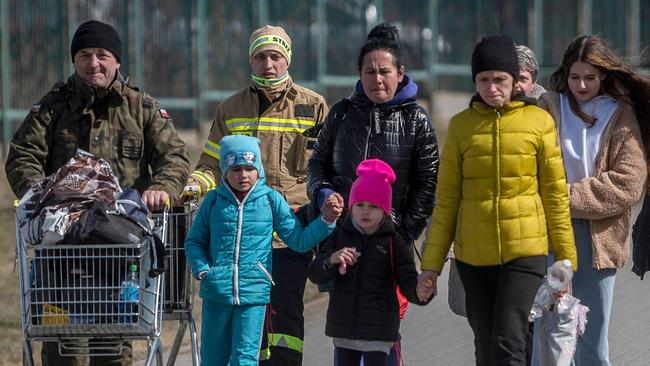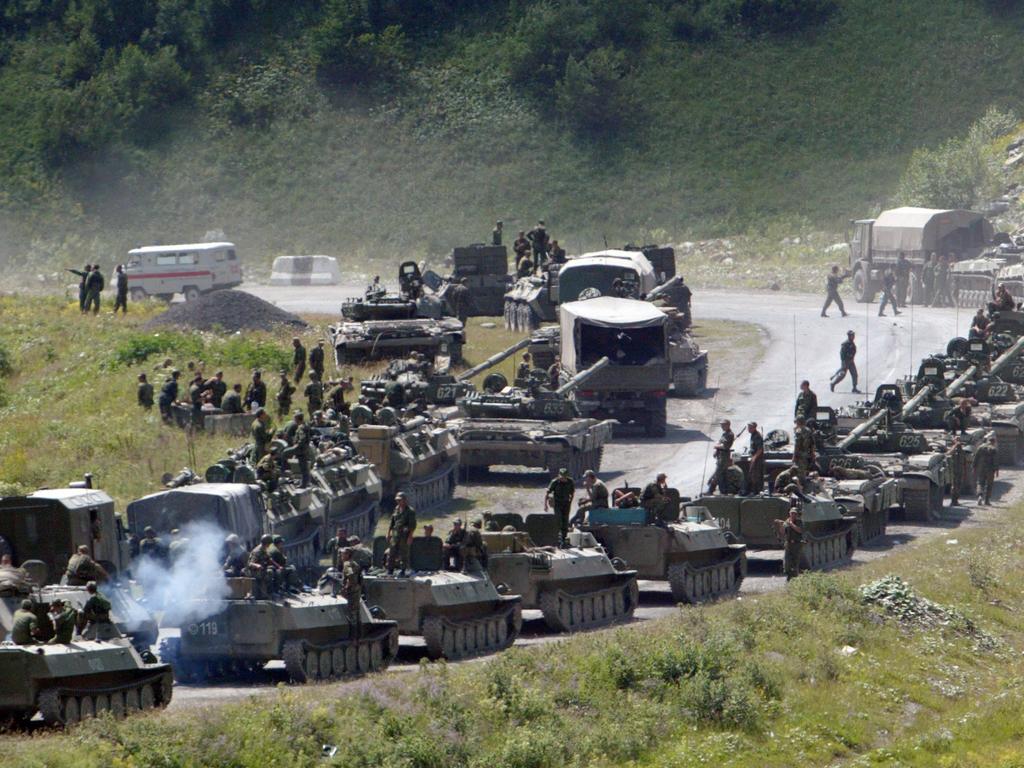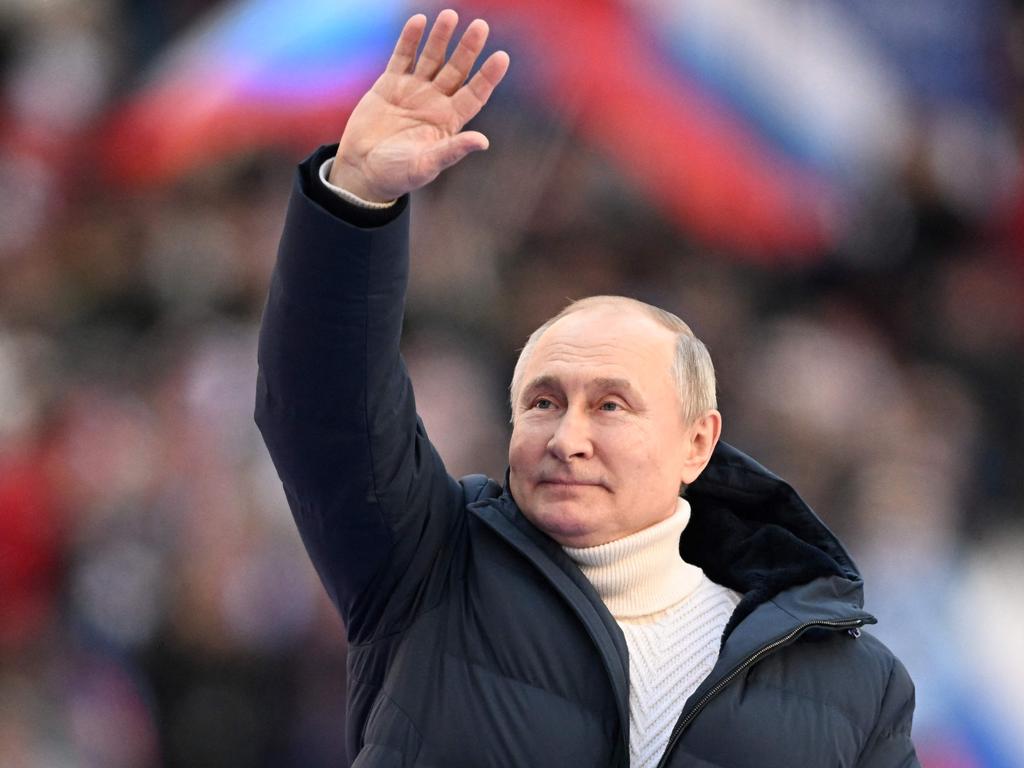
It is a perplexing snapshot of the public outlook after we have watched the appalling and transfixing and inspiring Ukrainian war, and the magnificent determination of Ukrainians that their nation will not perish from the face of the earth, that the Russian dictatorship will neither swallow up nor destroy them.
Foreign affairs polling is often limited by the fact most of the time most people don’t think about foreign issues. But surely Ukraine now is prominent in the Australian mind. And, of course, what we think now might be only a very rough guide to how many of us would actually behave in a crisis.
The polling was commissioned by former deputy prime minister John Anderson, who runs an absorbing website that tries to address these and other big issues.
Nonetheless, having made all the relevant allowances, the polling results, on their face, are a bit disconcerting. People were asked: what would you do if you were in the same position as the Ukrainians now? Some 53 per cent said they would leave the country, while 47 per cent said they would stay and fight. Most Coalition voters would stay and fight – 56 per cent to 44. Most Labor voters would flee, in an exact reverse of the figures: 56 per cent to 44. A much bigger majority of Greens voters, 61 per cent, would flee.
Men say they would stay and fight, in much larger numbers than women. Women may well be thinking of the need to protect children and parents. Older folks, however, are much more likely to stay and fight than younger people. Under the age of 35, adult men are split almost 50-50 in fight versus flee. But in the 35 to 54 age group, 64 per cent of men say they would stay and fight, and for men over 55 this rises to 68 per cent.
Women are more likely to stay and fight the older they are. Under 35, 76 per cent of adult women say they would leave. Among the 35 to 54 age group for women, 68 per cent say they would leave, and for over-55s women this falls to 59 per cent.
Respondents were offered only two choices – stay and fight versus flee the country. It may be that many women would choose an option not given, stay and help.
So, even making all the allowances for methodological ambiguity and the rest, the result is a little unhappy. When Quinnipiac University asked Americans the same question, a strong majority, 55 per cent, said they would stay and fight. Both Republicans and Democrats held this view, though Republicans held it more strongly.
Anderson’s poll asked another intriguing question. In light of the increased global tensions, should Australia expand its (army) school cadet corps? A heartening 65 per cent said yes, and only 35 per cent said no. Which leads me to ask this question – why hasn’t the Morrison government been pursuing initiatives like this all of its time in office?
Both Coalition and Labor voters by strong majorities support expanding cadet corps. Only Greens voters register a majority against school cadets.
Cadet corps were once tremendously popular. They foster values of positive citizenship, responsibility, teamwork, discipline and love of country. These are all qualities in short supply today, which we desperately need. They are unpopular with many progressive educators and contradict the elite zeitgeist in many ways. But it seems popular wisdom retains an affection for the cadets. As I say, it’s astonishing that allegedly conservative governments have not run on issues like this, not as their central platform but as part of a whole view of life.
Anderson told me: “The expansion of cadet training opportunities is worth pursuing. Conflict has changed. Our approach should recognise that we should have people well versed in traditional military and leadership skills.” He suggests there could be different strands within cadet corps, such as emergency response and cyber warfare.
He is struck, as I was, by the opposition of Greens voters to cadets. He says: “Greens voters also say they are the most likely to flee: why are they the least patriotic? Greens voters should recognise that none of their ideological objectives would survive the collapse of the liberal global order. Authoritarian regimes would not give a tinker’s cuss about things that matter so much to Greens. In many cases those causes would be unmentionable in a world lost to democracy.”
It further occurs to Anderson that Greens leader Adam Bandt has hailed New Zealand’s defence policy as the “gold standard”. That would mean cutting our defence budget in half.
So, what to make of this unsettling poll? First, Australians have a magnificent record of solidarity and heroism in the face of natural disaster. They run towards the disaster to help their fellows. So there is every likelihood that if our nation were really attacked, with all the insult and perfidy and horror that the Ukrainians have suffered at the hands of the Russian military, a strong principle of national and human solidarity would overtake these seeming ideological reflexes.
Ordinary people are often much more heroic than they ever expect themselves to be.
However, it’s a mistake to assume that everything is good with our country in the face of contrary evidence. Generations now have endured education systems that routinely teach that our country is evil at its core. Why would you consider dying to defend such a place?
Decent patriotism is not the same as hateful nationalism. The nation, like the family, is a natural unit of humanity and a natural locus of solidarity and affection. Human solidarity should ultimately be universal, which is why we all feel so moved by the heroism and suffering of the Ukrainians. A special loyalty to family and country is a normal part of a normal human being. The Fifth Commandment, after all, enjoins us to “honour your father and your mother”. This is a specific, special loyalty, among the grander injunction to love everyone, including your enemy. It is not negated by the universal injunction.
Postmodern ideology, so much at war with every aspect of human nature and, indeed, human goodness, hates these virtues, for they suggest humanity exists beyond their ideological constructs, in ways that are mysterious and enduring.
Tens of thousands of Ukrainians have rushed back to Ukraine to defend their country, as tens of thousands of Israelis rush back to Israel whenever that nation is threatened in war. Can it really be that we love Australia less?








A slim majority of Australians, if faced with a situation similar to that faced by Ukrainians, would not stay and fight for their country but would seek to flee overseas, according to a fascinating poll conducted by Compass Polling.